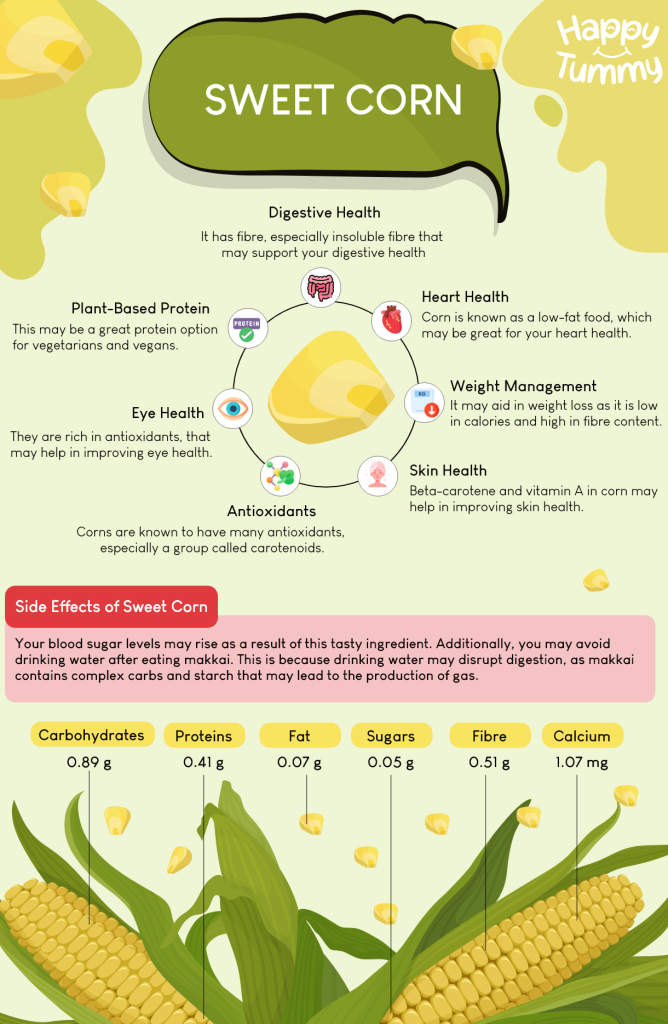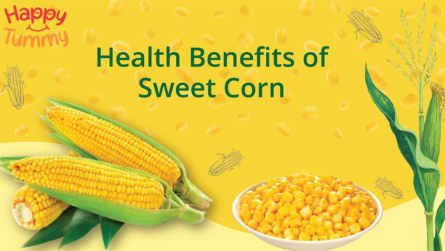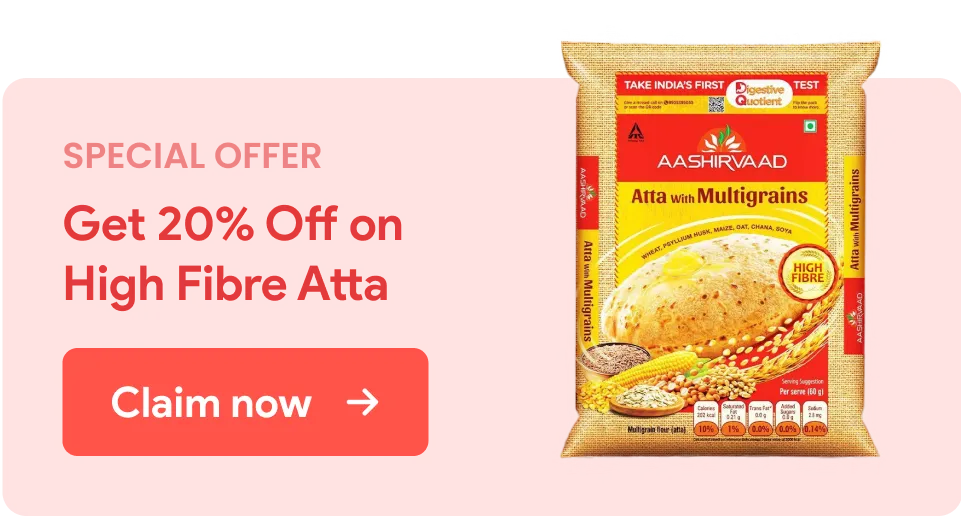Table of Contents
What is that one thing that comes to your mind when you see raindrops outside? No, we are not talking about the favourite combination of chai and pakoda.
There is one more item that is very famous, and people love to enjoy it, especially during the rainy season – bhutta. Bhutta, makki, corn, or maize, are known by different names, but it does bring a smile to our faces when we hear about it.
Today, we will be talking about the goodness of sweet corn, which gives a different taste when eaten on a cob and a unique taste when added to a curry or side dish.
People often get confused about what to call it – a fruit, vegetable, or a grain. When you eat it on the cob, it is a vegetable, and when it is dried, it becomes a grain. Interesting, isn’t it?
It is a versatile ingredient that has been used worldwide in different recipes and cuisines. You can add it to salads, soups, and even to your favourite pizza.
Let’s find out the fantastic benefits of this beautiful and delicious ingredient.
Nutritional Profile of Sweet Corn
Here is the nutritional profile of makkai (per 100 g edible portion): [1]
| Nutrient | Amount |
| Carbohydrates | 16.42 g |
| Proteins | 4.16 g |
| Sugars | 4.67 g |
| Fibre | 3.30 g |
| Calcium | 6.37 mg |
| Ascorbic Acid | 5.72 mg |
| Energy | 405 KJ |
| Carotenoids | 1035 |
Health Benefits of Makkai
Let’s look at some incredible health advantages of including this versatile ingredient in your diet.

#1. Digestive Health
This is a fantastic ingredient that may have good results on your gut health and keep your tummy happy tummy.
People often feel that corn is difficult to digest. However, the fact is that this ingredient has fibre, especially insoluble fibre that may support your digestive health by adding bulk to stool [2]. Evidence further confirms that the presence of Vitamins (A, B, E, and K), carotenoids, fibre, and flavonoids may improve digestive health.
If you plan to include this versatile ingredient in your diet, you can check the fibre content of the dishes on My Meal Plan by Aashirvaad. Also, you can take a Digestive Quotient Test by Aashirvaad Atta. It that can help you determine your digestive health in a few seconds.
#2. May Help Heart Health
Corn, a low-fat food, may be great for your heart health. The monosaturated and polyunsaturated fats are considered suitable for heart health [3].
Moreover, corn is also an excellent source of fibre. This fibre may help in preventing heart diseases by managing cholesterol and blood pressure.
#3. Sweet Corn Aids in Weight Management
You may want to include corn in your diet for weight management goals. Eating makkai may aid in weight loss as it is low in calories and high in fibre content.
High-fibre meals, such as corn may make you feel fuller faster and prolong the feeling of fullness [4].
You can always check with our dietician and experts on what kind of corn or corn products to use for effective weight loss and many other diet-related issues.
#4. Miracle Plant-Based Protein
Adding corn to your daily-to-eat recipes, such as salads, rice dishes, pasta, and more, may help you meet your protein needs.
This may be a great protein option for vegetarians and vegans. Protein may also help you keep full for longer and curb your hunger pranks.
Protein may also help in many essential body functions, including muscle growth and repair [5] [6].
#5. Antioxidants
Corns are known to have many antioxidants, especially a group called carotenoids (please refer to the table). Antioxidants provide a great protection from the harmful free radicals.
Free radicals are one of the reason for many chronic illnesses and also play a role in the early ageing process. Antioxidants present in makkai may help protect from free radicals, which might be supportive of overall physical health [7].
#6. Sweet Corn Improves Eye Health
Eye health, especially the growing cases of cataracts, has become a cause of concern.
Including a diet rich in antioxidants, such as corn, may help in improving eye health. There are two types of antioxidants, lutein and zeaxanthin, in corn that may support eye health.
These two carotenoids, which are likewise concentrated in the human macula and shield the photoreceptor cells in the eye from oxidative damage caused by blue light [8].
#7. Skin Health
Makkai is considered to be an excellent source of beta-carotene. This beta-carotene helps in the generation of vitamin A, which may stimulate collagen and improve skin texture.
It may also help soothe skin from irritation, making it smooth and shiny [9].
Side Effects of Sweet Corn
Makkai offers numerous health advantages. However, there are things that one must remember before consuming it. Your blood sugar levels may rise as a result of this tasty ingredient. Therefore, it is best to consult your doctor or nutritionist when adding it to your diet.
Additionally, you may need to avoid drinking water after eating makkai. Makkai contains complex carbs and starch that may lead to the gastric troubles if you drink water after eating it.
This gas may cause acidity, acid reflux, severe stomach pain, and flatulence. Therefore, it may be good to keep a gap of at least 30 -40 minutes before drinking water over your favourite grilled bhutta.
Try to remain cautious of the bhutta you eat from street carts; it may be bad for your health. There are many reasons, like the masala and lemon they use may be old and reused multiple times. Besides, mosquitoes and flies can be all around, which may be a health concern. This may lead to the spread of infections in our bodies.
How to Use Sweet Corn?
Here are some ways to include makkai in your diet.
- Grilled on the cob (bhutta)
- Topping on your pizza
- Make corn flour tortillas
- Can be eaten frozen or canned
- Sweetcorn rice
- Omelette with corns
- Vegetable soup with corn
- A side dish of stir-fry with corn
- Corn salsa
- Can be added to salad and pasta
Rainbow Corn Salad Recipe
This can be a great side dish to your curries and non-veg dishes.
Ingredients:
- Limes – 2 medium-sized
- Olive oil – ¼ cup
- Salt – ½ teaspoon
- Black pepper powder – ¼ teaspoon
- Corn – 2 cups
- Black beans – ½ cup (boiled or canned)
- Onion – ½ chopped
- Cherry tomatoes – a handful
- Coriander – ½ small bunch
- Avocados – 2 medium -ripe
- Cheese – as needed
Method:
- Take out the juice from the limes.
- Mix two tablespoons of lime juice, olive oil, salt, and black pepper in a bowl and give it a good whisk.
- Add corn, black beans, onion, cherry tomatoes, and coriander and give a good mix.
- Mix the chopped avocados.
- Drizzle the remaining lime juice and give a good mix.
- Sprinkle cheese if you wish and serve.
Boiled Sweet Corn
Ingredients:
- Sweet corn – as needed
- Salt – as per taste
- Black pepper powder – as per taste
- Water for boiling
Method:
- Place water to boil on high heat.
- Add corn and let them boil for 5-10 minutes.
- Remove from heat and strain using a filter.
- To taste, add salt and black pepper.
- Enjoy your hot-boiled sweet corn as an evening snack.
Corn Soup Recipe
Ingredients:
- Corn kernels – 4 cups
- Olive oil – 1 ½ tablespoons
- Onion – 3 cups chopped
- Carrots – 2 cups chopped
- Celery – 2 cups chopped
- Garlic – 2 teaspoons chopped
- All-purpose flour – ¼ cup
- Cumin – 1 teaspoon
- Vegetable stock – 6 cups
- Jalapeno peppers – 2 minced
- Half and half (a mixture of equal parts of milk and cream) – 1 ½ cups
- Salt – 1 teaspoon
- White pepper – 1/8 teaspoon
- Coriander – 1 tablespoon
Method:
- Heat your oven to 500 degrees.
- Place the corn on a baking sheet.
- Let them caramelise in the oven for 8 minutes.
- Heat the oil in a pan over medium high heat.
- Add carrots, onions, garlic, and celery and stir continuously.
- Cook for 5 minutes or until the vegetables are cooked and soft.
- Reduce the heat and add flour, cumin and corn and give it a good mix till the flour is absorbed.
- Add jalapenos and vegetable stock and let it simmer for 30 minutes.
- Mix salt, pepper, coriander, and half-and-half mixture.
- Remove from heat and serve immediately.
Final Thoughts
Including sweet corn in your diet may provide a plethora of health advantages in addition to a tasty boost. Enjoyed raw off the cob, perfectly grilled, or blended into a flavorful meal, this adaptable vegetable is nutrient-dense.
Sweet corn is an excellent complement to any balanced diet, encouraging overall health and vitality with its fibre, vitamins, and antioxidants.
Why then wait? Savour the golden deliciousness of sweet corn and benefit from all that it has to offer!
FAQs
Depending on when it is harvested, it is considered either a vegetable or a grain. When you consume it frozen, fresh, or canned, it is a starchy vegetable. When it is dried and matured, it is considered a grain. As a grain, it is used for popcorn, chips, corn tortillas, corn cereal, cornmeal, and polenta.
Eating 1cup (100gm) of makkai daily may be great for health. It may have potential benefits for the skin, may also help produce healthy cholesterol, may control anaemia and blood sugar, and may maintain an ideal body weight and vision. One may consider it a super diet of the modern day.
It is high in vitamins, fibre, carotene, and ferulic acid and thus may reduce cholesterol and blood sugar.
Because of their high nutritional content, crops like maize nevertheless require portion management. Despite having few calories, it may nonetheless cause weight gain if eaten in excess. Therefore, you may only eat one medium-sized ear or one cup (100 gm) of kernels of corn per day.
Like a lot of grains, legumes, and vegetables, corn is high in dietary fibre. Fibre may ease the digestive process and lower the chance of constipation.















